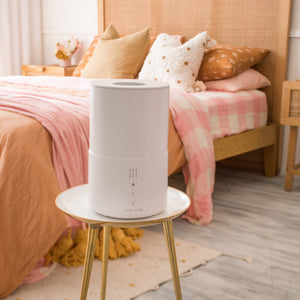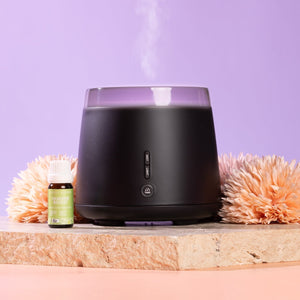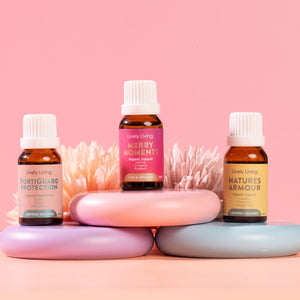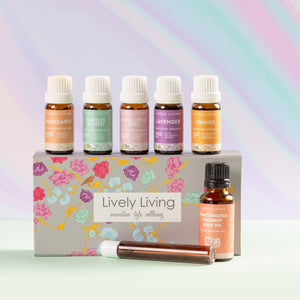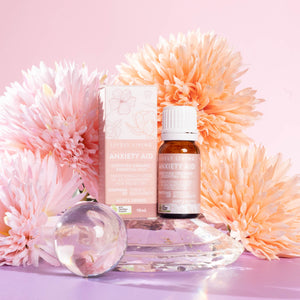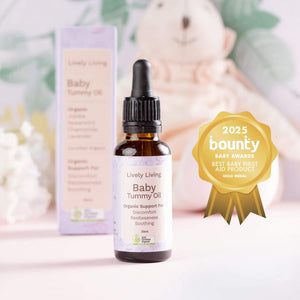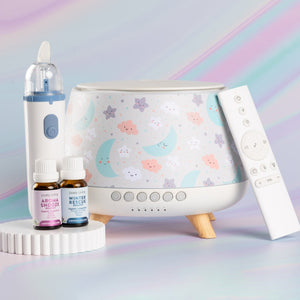Aromatherapy for Emotional Balance and Well-being: A Guide
Feeling like your emotions are on a rollercoaster sometimes? You are not alone. So many of us are looking for natural ways to feel more centered and calm. That is where exploring Aromatherapy for Emotional Balance and Well-being can be a significant help. It is a gentle yet powerful approach to help soothe your mind and lift your spirits, contributing to overall emotional wellbeing. You might be surprised how much something as simple as a scent can impact how you feel, making Aromatherapy for Emotional Balance and Well-being a wonderful complementary tool to have in your self-care kit.
Table of Contents:
- What Exactly Is Aromatherapy?
- How Scents Influence Your Mood
- Popular Essential Oils for Emotional Support
- Effective Aromatherapy for Emotional Balance and Well-being Techniques
- Soak Your Cares Away in an Aromatic BatM
- Building Your Personal Emotional Balance Ritual
- A Few Words on Safety
- Conclusion
What Exactly Is Aromatherapy?
So, what is all the buzz about aromatherapy? At its heart, it is a holistic healing treatment that uses natural plant extracts to promote health and well-being. These extracts, known as pure essential oils, are the fragrant essences of plants, flowers, bark, or leaves. Think of them as the plant's lifeblood, concentrated and potent; these essential oils offer various benefits.
People have used aromatic plant compounds for thousands of years, with evidence found in ancient civilizations from Egypt, China, and India. These cultures utilized them for religious ceremonies, perfumes, and medicine, understanding how certain oils influence mood. The actual term aromatherapy was coined by a French perfumer and chemist, René-Maurice Gattefossé, in 1937 after he discovered lavender essential oil helped heal a burn on his hand. This experience led him to research the healing properties of essential oils more deeply.
The idea behind aromatherapy is that inhaling these special scents from essential oils can stimulate brain function. It can also involve absorbing them through the skin, often diluted in a carrier oil. Many believe these oils provide benefits for physical and psychological wellness, aiding in emotional healing and supporting mental health.
How Scents Influence Your Mood
Ever walked past a bakery and suddenly felt happy remembering childhood treats? Or smelled a certain perfume and instantly thought of a loved one? That is your sense of smell in action; it is incredibly powerful and closely linked to your emotions and memories.
When you breathe in an essential oil molecule, it travels up your nose to the olfactory receptors. These receptors send messages directly to the limbic system, a part of your brain that deals with emotions, memory, and instincts. Experts at Johns Hopkins Medicine explain this connection is why smells can trigger such immediate and strong emotional responses; this is how essential oils influence mood.
Different scents can have different effects, and understanding the essential oil constituents can help explain why. Some might be calming, like lavender, while others could be energizing, such as citrus oils like sweet orange. Your brain interprets these aromatic messages, which can then influence your heart rate, stress levels, blood pressure, and breathing, demonstrating how essential oils influence overall feelings.
Popular Essential Oils for Emotional Support
With so many essential oils available, where do you start? Do not worry, I have got you. Here are some popular choices often turned to for their emotional benefits, including some well-loved for their ability to support mental calm. Remember, everyone experiences scents a bit differently, so what works wonders for one person might be just okay for another; personal exploration is important for emotional wellness.
Here is a table summarizing some key oils:
| Essential Oil | Primary Emotional Benefit | Scent Profile | Notes / Best For |
|---|---|---|---|
| Lavender Essential Oil | Calming, stress relief, aids restful sleep | Floral, sweet, herbaceous | Anxiety, insomnia, general relaxation. Its lavender essential properties are widely studied. |
| Chamomile (Roman/German) | Soothing, reduces irritability, promotes peace | Sweet, fruity, apple-like (Roman); sweet, herbaceous (German) | Nervous tension, impatience, children's restlessness. |
| Bergamot | Uplifting yet calming, eases agitation | Citrusy, slightly floral, fresh | Stress, sadness, nervous tension. (Photosensitive) |
| Frankincense | Grounding, quiets the mind, promotes peace | Woody, earthy, spicy, slightly fruity | Meditation, anxiety, mental chatter. |
| Lemon (a citrus oil) | Refreshing, improves concentration, mood-lifting | Clean, bright, citrusy | Mental fog, fatigue, needing a cheerful boost. |
| Sweet Orange / Orange Essential | Uplifting, reduces sadness/worry, promotes cheer | Sweet, citrusy, warm | Creating a happy atmosphere, seasonal blues. Orange essential oils are very popular. |
| Peppermint | Invigorating, stimulating, clears mental fog | Minty, sharp, refreshing | Fatigue, focus, headaches (diluted). Avoid near bedtime. |
| Grapefruit (a citrus oil) | Revitalizing, combats stress, lifts spirits | Tangy, fresh, bittersweet citrus | Sluggishness, mental exhaustion, mood balancing. |
| Sandalwood | Calming, meditative, soothes nervous tension | Rich, woody, sweet, exotic | Anxiety, stress, meditation. Source sustainably. |
| Cedarwood | Grounding, stabilizing, eases anxiety | Warm, woody, balsamic | Emotional balance, feelings of being overwhelmed. |
| Vetiver Essential Oils | Deeply relaxing, grounding, quiets overactive mind | Earthy, smoky, woody, slightly sweet | 'Oil of tranquility,' anxiety, insomnia, stress. Using vetiver essential oils can be very calming. |
| Ylang Ylang Essential Oils | Relaxing, aphrodisiac, mood uplifting, reduces tension | Sweet, floral, exotic, intense | Stress, anxiety, sadness, promoting self-confidence. Use ylang ylang essential oils sparingly due to strong scent. Ylang ylang essential is potent. |
| Clary Sage | Calming, stress-reducing, supports hormonal balance | Earthy, herbaceous, slightly floral, nutty | Stress, anxiety, menstrual discomfort, mood swings. Clary sage is valued for emotional wellbeing. |
| Rose Geranium | Balancing, mood-lifting, calming for nerves | Sweet, rosy, floral, slightly herbaceous | Anxiety, stress, hormonal balance, skin care. Rose geranium is excellent in oil blends. |
| Tea Tree | Cleansing, purifying, promotes feelings of clarity | Fresh, medicinal, camphoraceous, herbaceous | Mental fatigue (by refreshing senses), less for direct emotional soothing, more for creating a clean environment. Tea tree oil is an australian botanical. |
Oils for When Stress and Anxiety Creep In
Life can throw a lot at us, leading to various anxiety disorders or simply overwhelming days. These essential oils might help you find a bit of calm amidst the chaos and reduce stress. They can be a great complementary tool in your emotional wellness toolkit.
- Lavender essential oil: This is probably the most well-known calming oil. Many people use lavender to ease anxiety and promote restful sleep. Its gentle floral scent is like a soft blanket for your nerves; the benefits of lavender essential are numerous.
- Chamomile: Think of a soothing cup of chamomile tea. The essential oil (Roman or German) offers similar comforting and relaxing properties. It is particularly good for calming irritability and promoting peace, supporting emotional wellbeing.
- Bergamot: A unique citrus oil, bergamot is both uplifting and calming. It is often used to ease agitation and nervous tension. One thing to note is that bergamot can make your skin more sensitive to sunlight, so be careful if applying it topically.
- Frankincense: This ancient oil has a woody, earthy aroma. It is often used in meditation for its grounding effects. Many find it helps quiet the mind and deepen breathing, promoting a sense of peace.
- Ylang Ylang: Ylang ylang essential oils are famed for their ability to relax the mind and body. The sweet, exotic floral scent of ylang ylang can help alleviate stress, tension, and even promote a more positive emotional outlook. Ylang ylang essential properties are potent; a little goes a long way.
Oils to Lift Your Spirits and Brighten Your Day
Need a little pick-me-up or a boost for a positive emotional state? These zesty and cheerful oils might just do the trick. They can truly influence mood in a beneficial way.
- Lemon: The bright, clean scent of lemon is instantly refreshing. It is known for its ability to clear the mind, improve concentration, and give your mood a little lift. A whiff of lemon can feel like a burst of sunshine.
- Sweet Orange: This orange essential oil is like liquid happiness. Its warm, sweet, citrusy aroma from oils like sweet orange is wonderfully uplifting and can help reduce feelings of sadness or worry. It is a great oil for creating a cheerful atmosphere; orange essential oils are fantastic for this.
- Peppermint: Invigorating and stimulating, peppermint can help clear mental fog and boost energy levels. A little goes a long way with this strong oil. It can be great for focus, but perhaps avoid it right before bed.
- Grapefruit: Another fantastic citrus oil, grapefruit is tangy and revitalizing. It is often used to combat stress and lift spirits when you are feeling a bit down or sluggish. These citrus oils provide a noticeable lift.
- Rose Geranium: This beautifully scented oil is known for balancing emotions. Rose geranium can uplift the spirit while also calming frayed nerves, making it excellent for general emotional wellness.
Oils for Grounding and Finding Your Center
When you feel scattered or overwhelmed, these earthy scents can help bring you back to yourself. These essential oils provide a sense of stability.
- Sandalwood: With its rich, woody, and slightly sweet scent, sandalwood is prized for its calming and meditative properties. It can help soothe nervous tension and promote a sense of inner peace. Make sure to source it sustainably.
- Cedarwood: This oil has a warm, woody aroma reminiscent of a peaceful forest. It is known for its grounding and stabilizing effects, helping to ease anxiety and promote emotional balance.
- Vetiver essential oils: Deeply relaxing, vetiver has an earthy, smoky scent. It is sometimes called the oil of tranquility because of its powerful grounding qualities; vetiver essential properties are profound. It is excellent for quieting an overactive mind.
- Clary Sage: Known for its ability to soothe and calm, clary sage is particularly helpful during times of emotional turmoil or stress. Its earthy, herbaceous aroma can be very centering, contributing to emotional healing. Many find clary sage supportive.
Effective Aromatherapy for Emotional Balance and Well-being Techniques
Okay, so you have got some essential oils single or perhaps some essential oil blends. How do you actually use them to get these emotional benefits? Here are some simple and effective ways to incorporate using aromatherapy for emotional balance and well-being into your daily life, focusing on how to use essential oils safely.
Breathe It In with Diffusion
Diffusing is one of the easiest and most popular methods to reduce stress. A diffuser disperses essential oil molecules into the air, allowing you to breathe them in gently. Consider using specific diffuser blends designed for relaxation or mood elevation.
There are a few types:
- Ultrasonic diffusers: These use water and ultrasonic vibrations to create a fine mist. They also act as humidifiers, which is a nice bonus for dry environments.
- Nebulizing diffusers: These do not use water. They break down the pure essential oils into tiny particles using an atomizer, often providing a more concentrated aroma.
- Evaporative diffusers: These use a fan to blow air through a filter or pad saturated with essential oils. This method disperses scent quickly.
- Heat diffusers: These use gentle heat to evaporate the essential oil. While effective, some argue that heat can alter the chemical composition and therapeutic properties of the oil constituents.
Just add a few drops of your chosen oil (or blend) to the diffuser according to its instructions. It is a great way to scent your home or workspace and create a specific mood. Many oils offer different benefits when diffused.
Simple Inhalation Methods
You do not always need fancy equipment to experience the benefits oils provide. Try these simple techniques:
- Steam Inhalation: Add a couple of drops of essential oil to a bowl of hot (not boiling) water. Lean over the bowl, cover your head with a towel, and breathe deeply for a few minutes. This is great for clearing your head and can also offer some pain relief from sinus pressure.
- Direct from Bottle: You can carefully waft an open bottle of essential oil under your nose and take a few gentle breaths. Do not let the undiluted oil touch your skin. This method offers immediate olfactory input.
- Handkerchief or Tissue: Place a drop or two of essential oil on a tissue or handkerchief. Keep it with you and inhale as needed throughout theday. This is super handy when you are on the go.
Feel the Benefits with Topical Application
Applying essential oils to your skin lets them absorb into your body. But, this is super important: you must dilute them with a carrier oil first. Undiluted pure essential oils can irritate your skin or cause sensitization; it is crucial to use essential oils safely.
Good carrier oils include jojoba (excellent for hair care and skin care), almond, fractionated coconut oil (great for body care as it is non-greasy), or grapeseed oil. A general guideline for dilution for adults is 2-3 drops of essential oil per teaspoon (5ml) of carrier oil for creating your own massage oils or skin treatments. For more detailed dilution information and safety guides, it is good to check resources from trusted aromatherapy organizations like the Tisserand Institute, which provide expert advice on oil constituents and safe usage.
- Massage: Mix your diluted essential oil blend and use it for a relaxing self-massage or ask a partner. Focus on areas like your shoulders, neck, or feet. This is a fantastic way to combine the benefits of touch with aromatherapy.
- Pulse Points: Apply your diluted blend to pulse points like your wrists, temples, or behind your ears. The warmth of these areas can help diffuse the scent throughout the day.
- Rollerballs: You can buy pre-made rollerballs or make your own oil blends. They are perfect for targeted application and easy to carry with you.
Soak Your Cares Away in an Aromatic Bath
A warm bath with essential oils can be incredibly therapeutic. The steam helps you inhale the aroma, and the warm water helps your skin absorb the oils, promoting restful sleep or muscle relaxation. Do not just drip essential oils directly into the bathwater, as they will not mix and can irritate your skin.
Instead, mix 5-10 drops of essential oil with a tablespoon of carrier oil (like jojoba or almond oil) or a dispersant like full-fat milk or a handful of Epsom salts before adding to the bath. Then, lie back, relax, and breathe deeply. This practice can significantly improve sleep quality for many.
Create Your Own Aromatic Sprays
DIY sprays are easy to make and very versatile. You can use them as room sprays to freshen the air, facial mists for a quick refresh (using skin-safe oils like rose geranium), or as pillow mists to promote restful sleep. This is a great way to personalize your environment for emotional wellness.
To make a simple spray, mix about 10-15 drops of essential oil with 1 ounce of distilled water and 1 ounce of witch hazel or high-proof alcohol (like vodka) in a small spray bottle. Shake well before each use. Some people even use specific essential oils as a natural insect repellent in their sprays.
Building Your Personal Emotional Balance Ritual
The real magic happens when you make aromatherapy a consistent part of your routine, a dedicated practice for emotional healing. Think about how you can weave these practices into your day. It does not have to be complicated to support mental well-being.
Perhaps start your morning by diffusing an uplifting citrus oil like sweet orange while you get ready. During a stressful workday, take a moment to inhale calming lavender essential oil from a tissue. In the evening, a warm bath with chamomile and frankincense could be your way to unwind, fostering positive emotional states. By creating these little rituals, you give yourself moments of intentional self-care.
Experiment and see what feels good for you. Your connection to the scents and the essential oil constituents is what matters most. Consider keeping a journal to track how different essential oils influence your mood and overall emotional balance. This practice can also help you identify your favorite oil blends for various situations. You can even share share your positive experiences with friends or family who might benefit.
A Few Words on Safety
While essential oils are natural, they are also highly concentrated and powerful. It is important to use them respectfully and always use essential oils safely.
- Quality matters: Always choose high-quality, 100% pure essential oils from reputable brands. Avoid synthetic fragrance oils, as they do not offer the same therapeutic benefits and can sometimes cause irritation. Reputable suppliers often have transparent sourcing information and may offer details on their return policy or even free shipping for larger orders; check their privacy policy too, especially if you provide an email address for newsletters.
- Patch test: Before applying a new diluted essential oil topically, do a small patch test on your inner arm to check for any skin sensitivity. Wait 24 hours to see if there is a reaction. This is key to using oils safely on your skin.
- Photosensitivity: Some oils, particularly citrus oils like bergamot, lemon, and lime (many orange essential oils fall into this category), can make your skin more sensitive to UV light. Avoid direct sun exposure on areas where you have applied these oils for at least 12-24 hours.
- Special populations: Use extra caution with children, elderly individuals, pregnant or breastfeeding women, and pets. Some oils are not safe for these groups.
- No internal use unless guided: Please do not ingest essential oils unless you are under the specific guidance of a healthcare professional trained in their internal use. Most casual aromatherapy focuses on inhalation and safe topical application.
- Storage: Store your essential oils in dark glass bottles, away from heat and light, to preserve their potency and prevent degradation of the essential oil constituents. Proper storage ensures they remain effective for promoting emotional wellbeing.
- Consider pets: Many essential oils, i can be toxic to pets, especially cats and dogs, whether inhaled or applied to skin. Always diffuse in well-ventilated areas away from pets and never apply essential oils directly to your animal's fur or skin
Knowing When to Get More Help
Aromatherapy can be a wonderful support for your emotional well-being. But it is important to remember it is a complementary tool. It is not a replacement for professional medical or mental health treatment, especially for conditions like clinical anxiety disorders.
If you are struggling significantly with your emotions, anxiety, depression, or any mental health concerns, please reach out to a doctor, therapist, or counselor. They can give you the diagnosis and support you need to support mental health effectively.
Conclusion
Exploring scents through aromatherapy can be a deeply personal and rewarding journey for your emotional balance and well-being. The connection between aroma and emotion is powerful, and using essential oils can influence mood in profound ways. With a little knowledge and mindful practice, using essential oils, from calming lavender essential oil to uplifting sweet orange, can become a supportive tool in your daily life, aiding in pain relief or simply promoting a positive emotional state.










